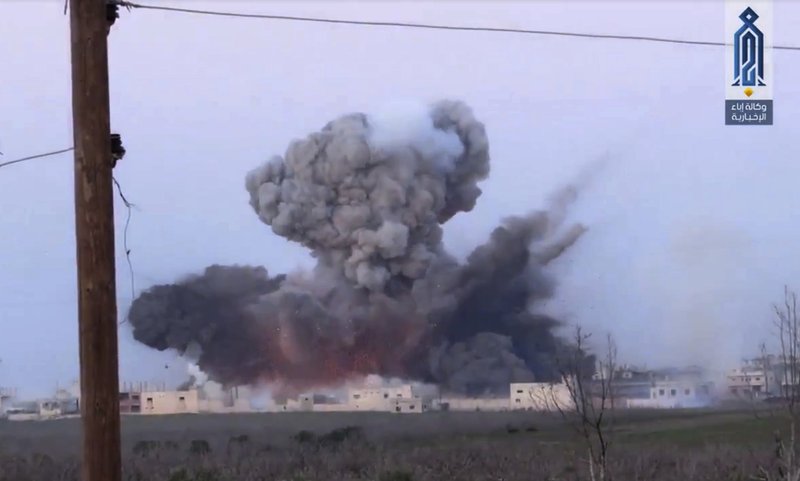BEIRUT -- Syrian government forces are besieging the last Islamic State stronghold in the northern province of Aleppo, weeks after launching an offensive to retake the entire province, state media and an opposition monitoring group reported Thursday.
The Syrian Central Military Media said Syrian troops launched the Deir Hafer siege late Wednesday after capturing nearby areas.
The opposition's Britain-based Syrian Observatory for Human Rights said Syrian troops have cut the road linking Deir Hafer with Raqqa province, which borders Aleppo. Raqqa city is the Islamic State's de facto capital.
The push on Deir Hafer came as U.S. aircraft ferried Syrian Kurdish fighters and allies behind Islamic State lines to spearhead a ground assault on the strategic, extremist-held town of Tabqa in Raqqa province.
The airlift near Tabqa marked a deepening U.S. involvement in Syria's conflict ahead of a battle for Raqqa.
The airlift was part of what Pentagon spokesman Eric Pahon described as a large, high-priority offensive to secure the area around Tabqa and the associated Tabqa Dam.
The U.S.-backed Syrian Democratic Forces said in a statement Thursday that its fighters, along with military advisers from the U.S.-led coalition, landed Tuesday night near Tabqa with their equipment and vehicles and have already secured a wide area.
"It has become a military base to launch our operations on the west bank of the river until eventually liberating all the countryside of Raqqa," the statement said.
Tabqa lies 28 miles west of Raqqa. The Islamic State, also known as ISIS, controls the town as well as the Tabqa Dam on the Euphrates River, which supplies electric power to the area and to a military airfield nearby.
The Syrian Democratic Forces' statement said the aim of the operation is to capture the town, its dam and the power stations. It called on all civilians to stay away from Islamic State positions and young men to join the anti-Islamic State force.
The Observatory also reported intense clashes in the central province of Hama, where insurgent groups spearheaded by al-Qaida's branch in Syria launched a wide offensive capturing dozens of villages and towns over the past two days.
The al-Qaida-led Levant Liberation Committee said its fighters captured three more villages Thursday morning.
The charity group Save the Children said the fighting in Hama has displaced 10,000 people.
The offensive coincides with another in the eastern neighborhoods of the capital, Damascus, which was also led by the Levant Liberation Committee.
Rebels have made marginal progress around an industrial area between the opposition-held Qaboun and Jobar neighborhoods but have failed to reach the heart of the city. The sounds of artillery fire and airstrikes have boomed across Damascus since Sunday.
Syria's Foreign Ministry said in a letter addressed to the U.N. secretary general that it had evidence that the Turkish, Qatari, and Saudi Arabian intelligence services were linked to the campaigns. The allegations could not be verified.
Those two offensives follow weeks of mounting pressure on the opposition to surrender in pockets outside Damascus. That campaign has been underway despite a nominal cease-fire signed in December.
A spokesman for the Ahrar al-Sham rebel faction described the two offensives as a message to negotiators in Geneva that "the revolutionaries are able to overturn the scales and return to a military solution."
"The international community is not serious about finding a just solution to restore the rights of the Syrian people and stop the criminal regime from killing civilians and displacing them," Ahmad Qara Ali said.
In Geneva, the top deputy for the U.N. Syria envoy shuttled between hotels to meet with representatives from the government and opposition groups ahead of the formal start of a fifth round of U.N.-mediated peace talks.
The U.N. envoy for Syria, Staffan de Mistura, issued a statement Thursday noting that all parties had arrived for the talks in Geneva.
His deputy, Ramzy Ramzy, kicked off the day by meeting with the government delegation. He is also expected to meet with opposition delegates for informal consultations.
Top rebel negotiator Mohammed Alloush said by telephone that he does not expect much progress from the new round of talks.
"The regime remains arrogant to calls for a cease-fire and to lift the sieges and release prisoners, and it refuses any progress toward the solution," Alloush said. "The ball now is in the regime's court."
Information for this article was contributed by Dominique Soguel and Philip Issa of The Associated Press.
A Section on 03/24/2017


